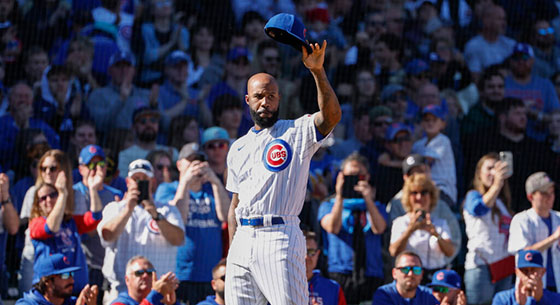
Impetus: the Chicago Cubs release Jason Heyward after seven years of his eight-year contract
Between 2008 and 2009, Jason Heyward was one of the most hyped prospects in baseball. After the 2009 season, he was the de facto #1 prospect in baseball. In the Spring Training of 2010, Heyward emerged onto the radar of the national spotlight when he clubbed a home run so far, it left the ballpark and shattered the windshield of a car in the parking lot.
He was so good, he forced the Atlanta Braves to put him on the Opening Day roster instead of taking part in the traditional practice of stashing him in the minors for two months in order to ensure that they can keep him for an additional year of indentured servitude known as team control, instead of getting to free agency.
That Opening Day, Jason Heyward took the first step to immortality by launching a three-run home run in his very first at-bat.
To this day, I still consider that day and that moment, one of the most magical sports memories I’ve ever had.
He performed so well through the first few years of his career, it became very apparent that he was going to become problematic in the sense that as he grew closer and closer to free agency, he was going to command a tremendous amount of money, and as any Braves fan can explain, the Braves absolutely do not like to spend money.
The inevitable became fulfilled when the Braves shipped him off to St. Louis for his contract year in exchange for a pitcher who still had team control available to him, and Heyward unsurprisingly put up a monster year for the Cardinals. He went into free agency in as optimal position as a player really could be in.
And the Chicago Cubs came knocking, as they signed him to an 8-year, $184 million contract. Jason Heyward had accomplished what just about every professional athlete strives to do; make it to the big leagues and perform well enough to where you can make it to free agency and cash in on a monster megadeal.
But then something interesting happened: Jason Heyward basically forgot how to play baseball. From the moment he suited up for the Cubs, he was mostly an offensive liability, hitting .245 and OPSing .700 between 2016 and 2022. Almost all of his value came from the fact that he was still a reliable glove in the outfield, winning two Gold Glove awards. That, and the fact that as a person, Jason Heyward has always been a pretty outstanding human being, personable, polite, philanthropic, and just a great teammate, as many of his peers have attested.
It also helped that the Cubs won the first World Series for the franchise in over 100 years, and if there’s anything that hides ineffective individual production, it’s success of the team, and the Cubs were positioned to be pretty good for a while. Nobody cared that Jason Heyward was no longer good at baseball, or was showing signs of being a massive contractual bust, because the Cubs had just won the World Series, and stories of the rain delay hype speech Heyward gave in the clubhouse in the 10th inning of Game 7 further bolster his intangible value to the team.
However, as the years ticked on, and the Cubs failed to reach the zenith repeatedly, it became more and more apparent that Jason Heyward just wasn’t really that good at baseball anymore, and was unfortunately already demonstrated to be a pretty massive bust of a contract.
Stat geeks boil down a player’s value to a catch-all stat known as Wins Above Replacement (WAR), and between 2016 and 2022, Heyward had only accumulated between 8-9 WAR depending on where you look; and the value of 1 WAR is roughly $7-8M depending on where you look, so basically mathematically, the Cubs had paid Jason Heyward roughly $128M but only received $64M of tangible production out of him
It didn’t seem likely that he was going to suddenly transform into the All-Star, MVP candidate he was for the Braves and Cardinals, so they decided to cut their losses and formally released him prior to the 2023 season.
The thing with baseball contracts though, is that they are 100% guaranteed. Despite the fact that Jason Heyward will no longer be on the Cubs, or in baseball at all for the matter, the Chicago Cubs are still 100% obligated to pay him the $22M he’s owed in 2023, as well as the four installments of $5M that kick in between 2024-2027.
In other words, the Cubs will be paying a 5-year, $42M dollar contract to nobody starting in 2023. Sports have control over too much fucking money.
Imagine what $42 million dollars could accomplish for any baseball team? Lock up an actually talented player for five years, or get one year out of a prime Shohei Ohtani with full incentives. There have been literal years where the entire payroll for teams like the Florida Marlins, Tampa Bay Rays and the Oakland Athletics haven’t hit $42 million dollars.
Imagine what $42 million dollars could accomplish, just about anywhere in the world other than sports? I’m pretty sure some hospitals, fire stations, or other critical infrastructure could be built, handily with $42 million bones. I’d estimate 300 students could get prestigious college educations, and tremendously more for more modest educations. Hell, chop up that $42 million into bite-size prizes to light fires under thousands of people all across the world, and see what positive results might emerge from that.
Instead, and this is no knock on Jason Heyward, I like the guy as a human being, and there was a point in time where I’d never think I’d see the day where he was unceremoniously cut for being a payroll ballast, the Cubs are quite literally pissing away $42 million dollars on absolutely nothing at all, because sports are absurd and have control over way too much money that would frankly be better allocated towards, again quite literally, anything.
I love sports, but god damn, is there a lot of money controlled by them, that in the grand scheme of things is just such a colossal fucking waste. Must be nice to be able to completely lose $42 million dollars and face no actual repercussions.
